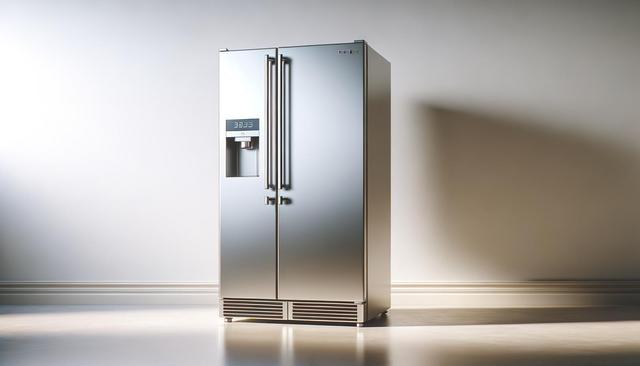Understanding the Differences Between Commercial and Household Refrigerators
At first glance, a refrigerator may seem like a standard appliance, whether it’s for home or commercial use. However, the differences go far beyond size. One of the key reasons why professional kitchens insist on using commercial refrigerators is their design and build quality. These refrigerators are engineered for heavy-duty performance, continuous usage, and higher efficiency in demanding environments.
Unlike household units, commercial refrigerators are made with stronger compressors, more durable materials, and better ventilation systems. This allows them to maintain consistent internal temperatures even when doors are opened frequently—a common occurrence in busy kitchens. When your home refrigerator starts to frost and the temperature fluctuates after 2 hours of operation, commercial units remain stable and frost-free, preserving food safety and quality.
Key differences include:
- Stronger cooling systems designed for frequent door opening
- Stainless steel construction for better hygiene and durability
- Adjustable shelving and storage tailored for large food items
- Advanced temperature control and monitoring systems
These features not only improve efficiency but also contribute to food safety, which is critical in any professional kitchen setting.
Temperature Stability and Food Safety
Temperature consistency is perhaps one of the most important factors in food preservation. Variability in temperature can lead to spoilage, bacterial growth, and ultimately, health risks. Why do professional kitchens insist on using commercial refrigerators? Because they are built to deliver unwavering temperature control throughout their operation.
Home refrigerators often fluctuate in temperature, especially after extended usage. It’s common for them to become less effective after a few hours of continuous operation. When your home refrigerator starts to frost and the temperature fluctuates after 2 hours of operation, commercial refrigerators are just getting started. Their powerful compressors and efficient insulation ensure that food stays within safe temperature ranges, even during peak service hours.
Reliable temperature control in commercial units helps:
- Prevent cross-contamination and spoilage
- Maintain freshness and taste of ingredients
- Comply with food safety regulations
- Reduce waste due to temperature-related spoilage
In high-paced kitchens, this reliability isn’t just a convenience—it’s a necessity.
Design Features That Support Professional Workflow
Commercial refrigerators are not only about cooling performance; they are also designed to enhance workflow in busy kitchens. From easy access to efficient storage, every feature is optimized for utility. Why do professional kitchens insist on using commercial refrigerators? Because they are tailored to meet the precise needs of culinary professionals who are constantly navigating tight schedules and high expectations.
These refrigerators often include:
- Glass doors for quick visual inventory
- Heavy-duty hinges and door closers to withstand frequent use
- Bright internal lighting for visibility
- Customizable shelving for specific storage needs
Such features might seem minor to the casual observer but are crucial for maintaining a smooth, efficient kitchen operation. Easy access to ingredients translates to faster prep times and better service delivery.
Moreover, commercial units are typically available in various configurations—upright, under-counter, or walk-in—making them adaptable to different kitchen layouts and sizes. This flexibility allows chefs and kitchen managers to optimize their space without compromising on storage or performance.
Energy Efficiency and Long-Term Cost Savings
Energy efficiency is another compelling reason why professional kitchens insist on using commercial refrigerators. While these units are more powerful, they are also designed to operate efficiently despite their heavy usage. Over time, the energy savings can be substantial—especially when compared to using multiple household refrigerators to meet commercial needs.
Commercial refrigerators often feature:
- High-efficiency compressors
- Eco-friendly refrigerants
- Better insulation to reduce energy loss
- Smart technology for energy monitoring and control
Although the upfront cost of a commercial refrigerator can be significant, the investment pays off in reduced energy bills, fewer maintenance issues, and increased lifespan of the appliance. Additionally, many models are now designed with sustainability in mind, helping businesses reduce their carbon footprint while maintaining operational excellence.
When your home refrigerator starts to frost and the temperature fluctuates after 2 hours of operation, you’re not only risking food safety but also increasing energy consumption due to inefficient cooling cycles. A commercial unit avoids these pitfalls with advanced engineering and smart design.
Maintenance and Compliance Benefits
Maintenance and regulatory compliance are often overlooked, but they play a critical role in the decision-making process. Why do professional kitchens insist on using commercial refrigerators? Because these units make it easier to meet health codes and inspection standards, and they’re built for easy maintenance and servicing.
Commercial refrigerators are typically equipped with:
- Digital temperature logs to meet inspection requirements
- Self-cleaning condensers or easy-access components for cleaning
- Alarm systems for temperature deviations
- Service-friendly design for quick repairs
These features ensure that the kitchen remains compliant with food safety regulations. They also minimize downtime, which can be costly in a commercial setting. When a refrigerator fails in a professional kitchen, it can result in significant food loss and disruption. That’s why reliability and ease of maintenance are so vital.
Additionally, staff training on commercial units is often more straightforward thanks to standardized controls and clear operational procedures. This helps reduce user error and contributes to the overall safety and efficiency of the kitchen environment.
Conclusion: Why Commercial Refrigerators Are a Professional Standard
In the fast-paced world of professional kitchens, reliability, performance, and compliance are non-negotiable. Why do professional kitchens insist on using commercial refrigerators? It’s not just about capacity! These units provide consistent temperature control, efficient energy use, and practical design features that support daily operations. When your home refrigerator starts to frost and the temperature fluctuates after 2 hours of operation, the limitations become painfully clear.
For restaurant owners, chefs, and food service professionals, investing in a commercial refrigerator means ensuring food safety, streamlining workflow, and ultimately protecting the reputation of their business. The decision goes beyond storage—it’s about maintaining quality, efficiency, and compliance in every service hour.






